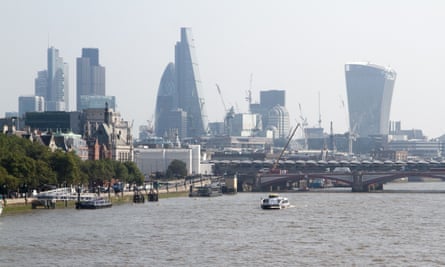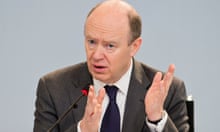The man in charge of promoting Frankfurt as a financial centre was clear that he had not come to London to coax the City’s bankers into defecting to Germany after the Brexit vote.
“We’re not here to poach business,” said Eric Menges, president of FrankfurtRheinMain GmbH, the region’s inward investment agency. “We’re not here to encourage you to leave London. We’re not here to tell you Frankfurt is better or worse than London.”
It was only by coincidence that he went on to list the many reasons why finance professionals might want to live in Frankfurt am Main: good universities, thriving local industry, dozens of international schools, great transport links, nearby forests and vineyards, to name a few.
Many bankers have moved to Frankfurt, he said, and “they aren’t dying of boredom or sausage and cabbage overdoses”.
The city’s mayor, Peter Feldmann, was rather less circumspect about his motives. “We’re on a marketing tour,” he said, adding the perhaps accidental barb: “I’m sure Frankfurt will become London’s economic gateway to the European Union.”
While Feldmann and his colleagues opposed Brexit, he believes it could be an opportunity for “building strong bridges” between London and Frankfurt. It seems fairly clear in which direction he expects the traffic on those bridges to move.
The two men were speaking on Wednesday evening at a reception for German and British businesspeople in the swanky surroundings of the Serpentine Sackler Gallery in London’s Hyde Park. Over glasses of riesling from the Rheingau region near Frankfurt, the Anglo-German business community talked of little else but the opportunity for growth at London’s expense, albeit with scrupulous respect for their host city.
Michael Mellinghoff is the managing director of the financial technology firm TechFluence, which helps match startup businesses with investors. “It [Brexit] is a chance to catch up for Frankfurt because London is so far ahead,” he admitted. “London is the world capital of fintech [financial technology] and that’s clearly at risk.”
He said companies were making early inquiries about possible alternatives to London while they waited for the detail of what exactly Brexit means – beyond, of course, Brexit.
“The phones are ringing in Berlin and Frankfurt, they’re ringing in Dublin, they’re ringing in Luxembourg. People are exploring their options already, of course. If you ask me, Britain has shot itself in the foot – from a logical angle there are not many pros.
“Most people are very disappointed about the decision because it brings the UK further away from Germany and the EU. But if it is happening, it is a chance for cities like Frankfurt to take advantage.”
Andrea Metz, a lawyer with Luther, a large German business law firm with an office in London, said Frankfurt had the space to accommodate those disillusioned by the Brexit vote and the right conditions to help them prosper. “There is a lot of office space unused,” she explained. “Companies in the financial sector also need to save money, so if they relocate to a less expensive city it can be good for the staff and good for them.”
There’s no doubt that Frankfurt, while not on a par with London as a truly global city, boasts comparable history and culture as a trade centre. It has been a hub for European mercantilism since the 12th century, while the Frankfurt Messe – or trade fair – has endured for half a millennium.

It can call on nearby university cities such as Heidelberg for innovation, hosts more tech start-ups than San Francisco and can market products to 40 millions customers within a 200km (124 mile) radius.
Automotive giants such as General Motors, Honda and Mazda have major operations in the region, and about 10% of goods with a Made in Germany stamp on them come from the FrankfurtRheinMain region.
Menges insisted that these were not advantages that Frankfurt has over London, but advantages it has over rival cities vying for post-Brexit business. “We’re here to make it clear that if a businesses decide they have to go elsewhere, we want to be the first port of call.
“We’re not competing against London, we’re competing against other locations for business that might decide to go elsewhere. I think in terms of financial sector it’s clearly Paris and Dublin.”
A recent study by Boston Consulting Group thinks Frankfurt is in the lead.
Based on the views of 360 leading bankers, it concluded that London could lose 20% of its financial services jobs, with Frankfurt best placed to hoover them up. To make sure it steals a march on its competitors, FrankfurtRheinMain GmbH is even setting up an office in London to extoll the virtues of the “financial centre of the Eurozone” and home city of the European Central Bank.
That’s a measure of the fact that in some ways, Frankfurt was better prepared for Brexit than the UK was. “We visited London many times in the lead-up to it. The closer it came, the more we said we needed to prepare for this,” Menges recalls.
The early-bird attitude, so often the stereotype about Germans, is already yielding results. Nobody has yet pressed the button on a move to Frankfurt, says Menges, but they are certainly casing the joint.
“People have to prepare their strategy so we get a lot of calls gathering information. We get calls from law firms saying, ‘We have a client who requires information.’”
Ultimately, the upside for Frankfurt will depend on which version of Brexit the UK eventually opts for, with freedom of movement for EU workers and the single market the key issues. “One would assume that the harder the exit, the bigger the opportunity.”
Dublin and Paris haven’t hit the ground at quite the same sprinting pace as Frankfurt, but are also keen to show off their credentials to London bankers.
“There’s a realisation we can’t win all the business, no city can,” said a spokesperson for the Dublin Chamber of Commerce. “But Dublin has some fantastic attributes that will help it pick up some business from Brexit. Financial services have been well-flagged as an area of potential. The fact we’re so close to London helps – it’s just an hour away – and then there’s the language thing as well, while some of our systems and laws are fairly similar.
In Paris, they are also talking a good game. Arnaud Bresson, managing director of Paris-Europlace, said: “The big advantage of Paris compared to Frankfurt is that it is much more a business centre for the international banks and Paris is much more capital market-minded, closer to London.”
He points out that Paris is also taking concrete measures, setting up a “welcome office” in the city to help new arrivals fit in and tweaking the rules of “inpatriate status” – France’s answer to non-dom status – by extending tax advantages for high-earners from five years to eight years.
France’s prime minister, Manuel Valls, also insists that Paris can be the “financial capital of the future”.
Perhaps. But for the moment, Frankfurt is out in front.











Comments (…)
Sign in or create your Guardian account to join the discussion